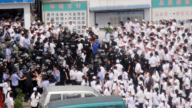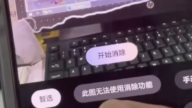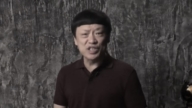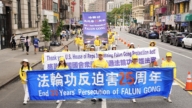【新唐人2011年7月15日讯】“微博”等新媒体越来越成为舆情热点的首发媒体。中国“微博”用户超过六千万人,去年中国发生的重大社会事件,有超过两成是由“微博”首发。也有越来越多的大陆网民利用手机把讯息发送到“微博”,用户也从最初“晒心情”,到通过微博“自由发表言论,披露社会事件”。分析指出,“微博”已对新闻和舆论传播产生革命性影响。
中共社会科学院7月13号发布2011年《舆情蓝皮书》。
《蓝皮书》数据显示,去年是“微博”的急速成长之年,2010年138起社会舆情热点事件中,“微博”首次曝光的事件为22起,比重约由2009年的0%上升为16%。并且,2010年大部分社会舆情事件中都有“微博”的介入。
据了解,“微博”发展如此之快,在某种意义上不得不说是因为中共封锁了Facebook,Twitter等海外竞争对手,而给“国产微博”留下了空间。
《美国之音》11号一篇文章说,当年因为担心“推特”(Twitter)会打破中共当局的信息封锁,因此中共封锁了“推特”。总部设在美国,不受中共宣传部门控制的“推特”虽然在中国遭到封杀,却给中国国内研发的“微博”带来了发展的机遇,中国的“微博”正在获得成功,正在成功的打破信息封锁。于是乎,报导说,力图封锁信息流通的中共当局的成功,正在给自己带来失败。
文章说,这种观点可以说是外国媒体看中国的共识。
维权人士孙2代:“中共为什么会害怕微博这些言论,主要是说微博给人家一个,国内唯一一个可以讲话的平台。”
“微博”不仅因为它的爆料功能强,能引发网路民意,迫使传统媒体跟进,打破一言堂口径,形成舆论高潮。同时还由于它的“神速”,使得当局的网管删到手软也来不及。
例如,一个名叫“香港新闻记者”的微博用户(http://weibo.com/1879620225),北京时间7月10号晚上10点半,在自己的微博贴出一条胡锦涛访问日本横滨的一个小学校、跟小学生对话的老新闻视频。
日本小学生:“胡爷爷,你为什么想当主席?”
胡锦涛:“我告诉你,我本人没有想当主席。全国人民选了我,让我当主席。我不应该辜负全国人民的期望。”
这条微博帖子在24小时之内,被转发2150次,并得到830条评论,让中共控制舆论的官员哭笑不得。虽然这位“香港新闻记者”因此微博被封,但是这个帖子由于引发的讨论,已经被微博之外的媒体转载,当然同时还有那些对胡锦涛不大恭维的评论。
维权人士孙2代表示,想封住“微博”的言论不太可能。只要网民懂一点电脑技术。
维权人士孙2代:“我每天做的微博把它在电脑里面存档,如果你把我的微博封掉了,我可以在很短时间之内用另外一个名字再复活出来,再重新做。中共打压这些微博,它就形成了一种恶性循环。它越打压,人民就越反抗。你不打压,你提供人民自由,你放到平台上,它怕丢了政权。”
社科院的《舆情蓝皮书》发布会上,有专家说,内地网民透过技术绕过内地俗称长城的防火墙,借此浏览境外网站,可能危害到国家安全,因此当局有必要管控。
那么,如果说,中共当局管控Twitter,却给自己带来这波“微博的冲击”,下一步如果试图再加强管控网络和言论,那么,中国将会有怎样意料不到的结果呢?
新唐人记者代静、尚燕、黎安安采访报导。
====
Microblogs Slam Internet Blockage
Microblogs and other new media are increasingly becoming a hot spot for first-hand news.
China has more than 60 million microbloggers.
20% of major social events in China in 2010 were first reported through microblogs.
An increasing number of Chinese netizens send messages from cell phones to microblogs.
From initially expressing their feelings,
the bloggers now use the microblogs to disclose social events.
Analysis showed that the micro-blogs have a revolutionary impact on the news and mass media.
On July 13, “2011 Blue book of Social Opinion" was published by Chinese Academy of Social Sciences.
According to the Blue Book, year 2010 saw the rapid growth of microblogging.
In 2010, out of 138 hot social events, 22 were first revealed on microblogs.
The proportion of hot events revealed by microblogging jumped from 0% in 2009 to 16% in 2010.
Also, most of the social public opinion events involved microblogging.
It is understood that the reason of microblogs’ rapid growth is
the Chinese Communist Party’s (CCP) blockage of their overseas competitors, such as Facebook and Twitter.
Therefore, a space was created for China’s homemade microblogs.
On July 11, according to an article from Voice of America,
fearing that Twitter might break its information blockage, the CCP blocked Twitter. Blockage of the U.S.-headquartered Twitter brought a great opportunity for the development of the Chinese microblogs.
They have become successful in breaking the CCP’s information blockage.
Therefore, the CCP’s success in blocking Twitter is bringing its own downfall.
The article said that this view on China is the consensus of foreign media.
Rights Activist Mr. Sun: Why CCP is so afraid of microblogging?
Because the microblogs provide people with the only platform in China,
where people can freely exchange opinions.
Microblogs’ popularity comes from their ability to expose breaking news, to encourage public opinions,
to break the CCP’s monopoly of press and information and their speediness.
The CCP cannot delete the messages on microblogs as fast as they are posted.
For example, at 10:30 p.m. on July 10,
a microblogger named “Hong Kong journalist" posted a video of CCP leader Hu Jintao’s conversation
with a Japanese school pupil on his visit to an elementary school in Yokohama, Japan.
Japanese pupil: Grandpa Hu, why do you want to be a chairman?"
Hu Jintao: “I didn’t want to be chairman.
It’s because all Chinese people elected me to be the chairman.
I should live up to the expectations of Chinese people. “
Within 24 hours, this post was copied 2,150 times, and it received 830 comments.
This greatly embarrassed the CCP officials in charge of controlling the public opinions.
Although the CCP blocked the microblog of “Hong Kong journalist” immediately afterwards,
other media reported the discussions of this post, as well as the negative comments about Hu.
Activist Mr. Sun said that it is almost impossible to block comments on microblogs,
as long as Netizens have a little bit computer skills.
Rights Activist Mr. Sun: “I archive all my microblog posts in my computer.
If the authorities block my microblog,
I will simply blog again with a new account.
The CCP’s suppression of microblogs has gone into a circle.
The harder it oppresses, the more people resist.
The CCP dare not give people freedom of expression, because it fears the loss of its power.
On the book release conference of “2011 Blue book of Social Opinion",
some experts said that Chinese netizens can bypass the CCP’s great firewall (i.e. GFW) to visit overseas websites.
They said this might jeopardize China’s state security, so the authorities should control it.
As Chinese authorities’ blockage of Twitter brings to themselves the impact of microblogs,
what will result if they try to further strengthen the management and control of the Internet and speech?
NTD reporters Dai Jing,Shang Yan and Li An’ an.






























